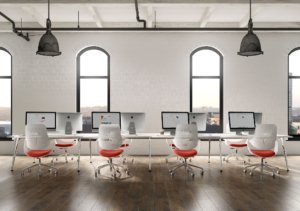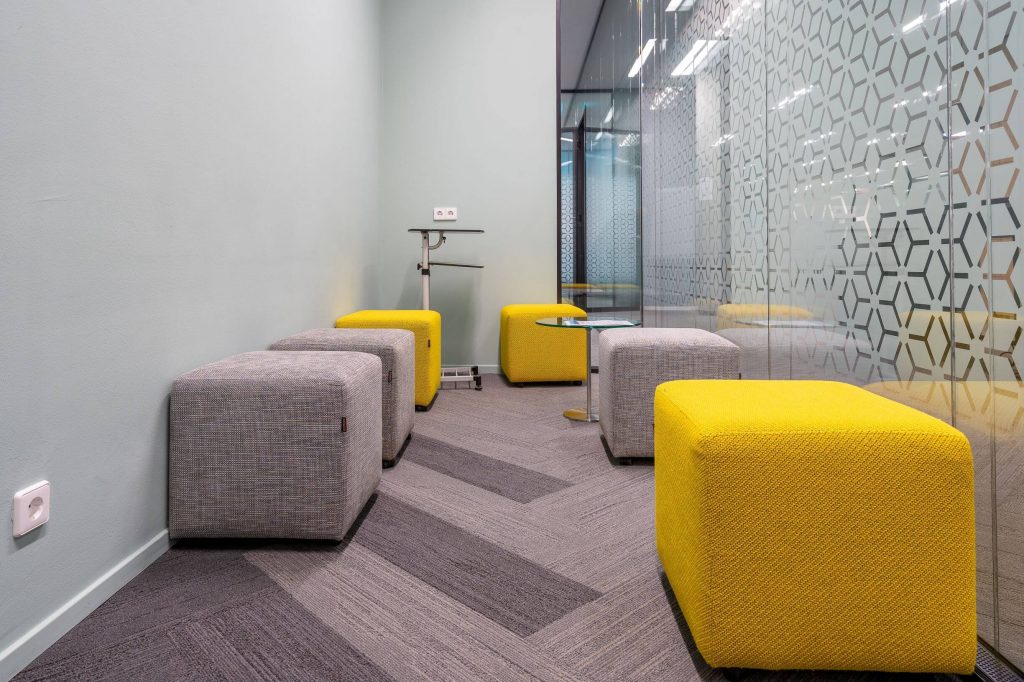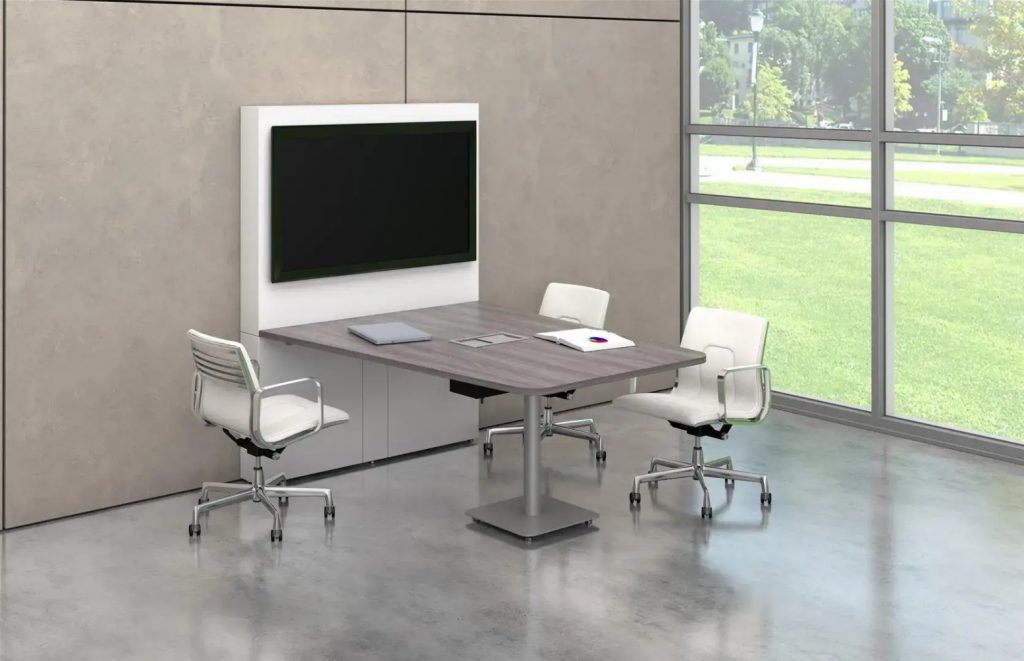How to Build a Millennial-Friendly Workplace in 2026

Today’s Millennial generation will make up more than 40% of the global workforce by 2026, with many of them in management and leadership positions.
This generation, more than anything, is looking for jobs that are purposeful, provide financial security, and at the same time care about their mental health and quality of life.
But the reality is that in today’s workplace, many millennials are looking for new job opportunities due to burnout and a lack of appreciation.
For this reason, if businesses want to attract and retain the best talent, they must create their work environment in a way that is attractive and motivating for this generation.
Now the question is: How to build a millennial-friendly workplace in 2026?
To build a millennial-friendly workplace in 2026, focus on flexible work options, collaborative spaces, sustainable furniture, advanced tech integration, and a culture that values well-being, growth, and inclusivity.
According to Recruiting.com, the workspace you offer your employees has as much impact on their job satisfaction and happiness as their actual salary, so designing a comfortable, welcoming, and appealing space can help your brand in more ways than one.
According to Deloitte’s 2026 Gen Z & Millennial Survey, 92 % of these professionals rate “purpose” as essential to job satisfaction, outranking salary, perks, or titles.
And when is it missing? Gallup estimates that millennial turnover costs U.S. companies a staggering $30 billion every year.
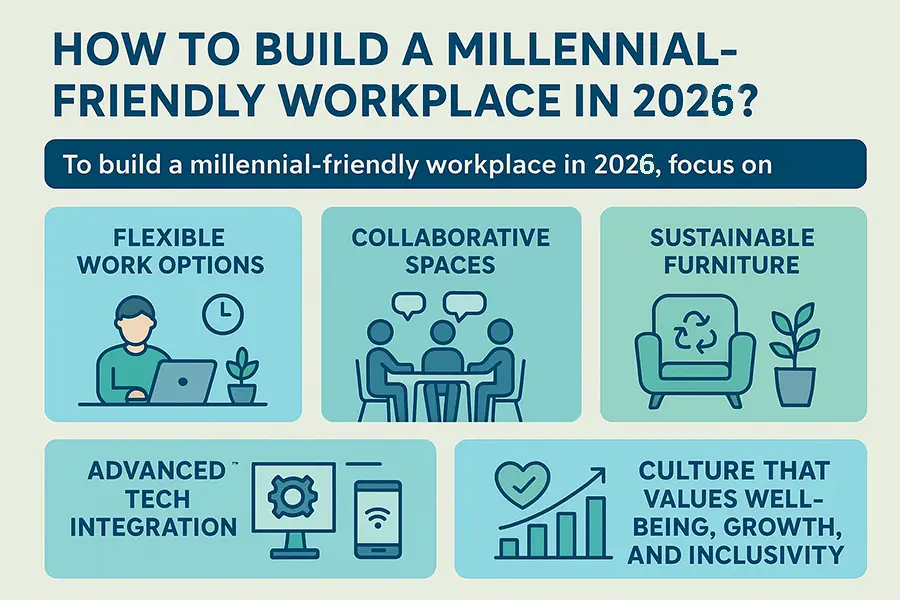
You Might Also Enjoy: Why The Millennial Workforce Matters In 2026
Office Furniture for a Millennial-Friendly Workplace
Above all, the workspace can be one of the most important factors in attracting millennial workers.
Workplace design, commercial office furniture, and how they are arranged are among the most important.
1. Flexibility and Adaptability
One way to build a millennial-friendly workplace in 2026 is to create flexibility in the environment.
Because they like to work in a space that is not limited to a fixed format and can change their work environment based on work conditions, projects, and even their daily mood.
In this regard, modular office furniture plays a very important role.
The use of movable office desks, partitions, demountable walls Houston, and multi-functional chairs allows employees to arrange their workspace in a dynamic and personalized way.
For example, a team can easily create an open, group environment for meetings and teamwork, and then transform that same space into a quiet, individual environment for focus.
2. Ergonomics and Well-being
Millennials know that sustained productivity and job satisfaction can only be achieved when the body is in good condition.
For this reason, designing the workplace using ergonomic office chairs, sit-stand desks, and proper lighting becomes of great importance.
These elements both prevent physical problems such as back pain, fatigue, or injuries caused by long-term work and make employees feel more comfortable and satisfied with their workspace.
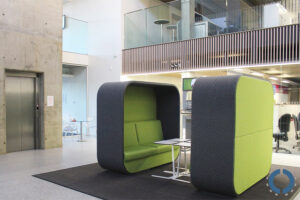 3. Spaces for Collaboration and Socialization
3. Spaces for Collaboration and Socialization
Millennials value social interaction and teamwork, and see the workplace as an opportunity for connection, learning, and synergy.
For this reason, designing an environment that provides open and flexible spaces for collaboration plays a key role in satisfying and motivating this generation.
Using comfortable furniture for informal meetings, collaborative workstations, benching systems, discussion lounges for exchanging ideas, and creative corners for brainstorming allows employees to share their ideas freely.
4. Aesthetic and Purpose-Driven Design
Millennials see the workplace as part of their personal identity and lifestyle.
For this reason, using energizing colors, employing sustainable materials, and creating spaces with an eye-catching visual effect can give employees a sense of belonging, motivation, and even pride in their workplace.
Such an approach is directly related to social impact and sustainable values, which the millennial generation attaches great importance to.
You Might Also Enjoy: How to Arrange Office Furniture in 2026
5. Privacy and Acoustic Areas in the Workplace
Along with open, interactive spaces, millennials equally need private, quiet areas to focus.
Therefore, the design of private office cubicles, acoustic spaces, and special concentration areas is of great importance.
The use of acoustic furniture, such as sound-absorbing partitions, capsule seating, and acoustic pods, is an effective solution for balancing social interaction and individual privacy.
On the other hand, providing these private areas can lead to reduced stress, increased sense of security, and ultimately improved mental health and job satisfaction.
Core Elements of a Millennial-Friendly Workplace
1. Make Flexibility in Working Methods
Today, hybrid work and remote work have replaced traditional workspaces and are of great importance to the millennial generation.
In this case, employees, without informing their employer, are actually working remotely from a recreational or travel location.
This shows that millennials are keen to maintain a balance between their personal and professional lives.
They are looking to be both more productive and have more freedom to manage their time and place of work.
For this reason, organizations must be able to maintain boundaries between work and personal life to prevent burnout and job dissatisfaction.
Also, the ability to collaborate, to gather as they’d like for conversations and simple companionship, is a big deal for this socially connected generation.
According to Forbes magazine, Millennials simply can’t resist collaborative workspaces and give priority to brands that offer them.
2. Continuous Learning and Career Development
One of the defining characteristics of the Millennial generation is that they consider learning and personal growth even more important than traditional career advancement.
Millennials prefer to work in environments that provide them with opportunities to acquire new skills and grow professionally.
To meet this need, organizations should design programs such as mentorship programs, upskilling opportunities, and clear career paths for advancement.
These measures will both increase employee motivation and prevent talent loss in the company.
Millennials also place great importance on accredited degrees, practical training courses, and valuable experiences, as these are considered assets for their future careers.
As a result, a company that provides such opportunities will be more attractive and lasting for this generation.
 3. Consider Mental Health and Well-being
3. Consider Mental Health and Well-being
One of the biggest priorities for millennials in the workplace is addressing issues related to mental health.
According to The Economic Times, rates of burnout, anxiety, and even depression are increasing among employees of this generation.
The main reasons for this are often work pressures, lack of adequate support, and unclear boundaries between personal and professional life.
To solve this problem, organizations must design and implement serious employee wellness programs.
Providing mental health-related resources and services, such as counseling or access to professionals, can have a significant impact on reducing stress and improving job satisfaction.
On the other hand, Millennials care more about work-life balance than any other generation.
Organizations should respect employees’ personal time and create conditions where employees can pursue their lives and interests after work hours.
Such an approach both increases productivity and strengthens employee loyalty to the organization.
You Might Also Enjoy: Demountable Walls Vs Drywall: Ultimate Guide [2026]
4. Purpose-driven culture and social impact
One of the most important priorities for the millennial generation when choosing a workplace is the alignment of personal values with the values and culture of the organization.
According to research, this generation is looking for companies that are not just about financial profit but have a mission and goals that align with social and human concerns.
Therefore, one way to build a millennial-friendly workplace in 2026 is for organizations to be active in corporate social responsibility initiatives and communicate their true impact on society transparently and honestly to employees and audiences.
Participating in environmental projects, supporting local communities, or participating in charitable activities are examples of actions that are of great importance to millennials.
This generation also remains loyal only to organizations that are honest and responsible in their words and actions.
For this reason, a purpose-driven culture is essential for businesses that want to stay relevant in 2026 and beyond.
5. Technological Integration: Tools for Efficiency
Today, technology has become an obvious expectation in the workplace for the millennial generation, who are highly familiar with digital tools.
Using communication platforms and project management software not only speeds up work but also enables more effective teamwork, especially in remote or hybrid work situations.
Organizations need to look for tools that make communication easier, project coordination smoother, and enable working from anywhere.
This aligns directly with the working style of millennials, who value freedom and flexibility.
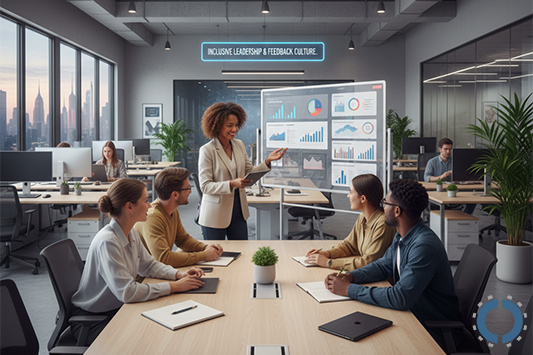 6. Inclusive Leadership and Feedback Culture
6. Inclusive Leadership and Feedback Culture
Millennials seek environments where leadership is empathetic, transparent, and inclusive.
They place great value on managers who not only have the ability to lead a team but also respect the individual perspectives and needs of employees.
One way to build a millennial-friendly workplace in 2026 is to implement this leadership style that makes employees feel heard and valued.
Additionally, developing a culture of regular feedback is of particular importance.
Millennials like to be constantly informed about their performance, identify their strengths and opportunities for improvement, and be involved in decision-making.
Conclusion
Building a millennial-friendly workplace in 2026 requires simultaneous attention to several important and practical aspects.
Organizations that implement these principles in their workplaces can not only attract and retain the best millennial talent but also increase productivity and job satisfaction.
Investing in this type of work environment brings long-term benefits to organizations, such as reducing turnover rates, boosting creativity and innovation, and creating a strong and reputable brand position in the labor market.
In other words, building a millennial-friendly workplace is a perfect strategy for organizations to prepare for the future.
FAQ (2026 Edition)
1. Why is a flexible work environment important for millennials?
Millennials are looking for a balance between their personal and professional lives.
Offering flexible work options, such as remote working or flexible shifts, can help them be more productive and prevent burnout.
2. What kind of leadership do millennials prefer in the workplace?
They prefer empathetic and transparent leadership.
They are more attracted to managers who listen to their opinions and involve them in decision-making.
3. What elements are essential in workplace design for millennials?
The use of ergonomic furniture, open collaboration spaces, private areas for concentration, and design with sustainable materials are among the elements that millennials value in the workplace.
4. Why is mental health in the workplace important for millennials?
Millennials care about their mental health.
Offering wellness programs, mental health resources, and respecting their personal time can help increase job satisfaction and reduce stress.
5. How can we make our workplace more attractive to millennials?
By providing learning and development opportunities, creating a culture of regular feedback, and designing a flexible and goal-oriented workplace, we can create an engaging environment for millennials.

John Ofield is the owner of Collaborative Office Interiors. Houston’s trusted source for modern and commercial office furniture, office cubicles, demountable walls, office desks and tables, and complete workspace solutions. With more than 40 years of experience, he combines deep product knowledge with hands-on space-planning expertise to create ergonomic, productivity-focused work environments for businesses across Southeast Texas.

